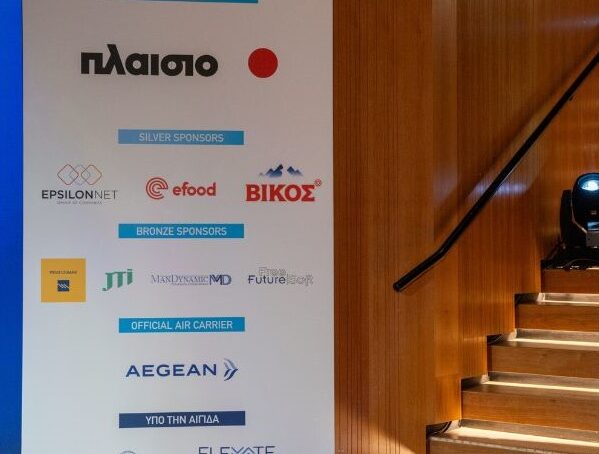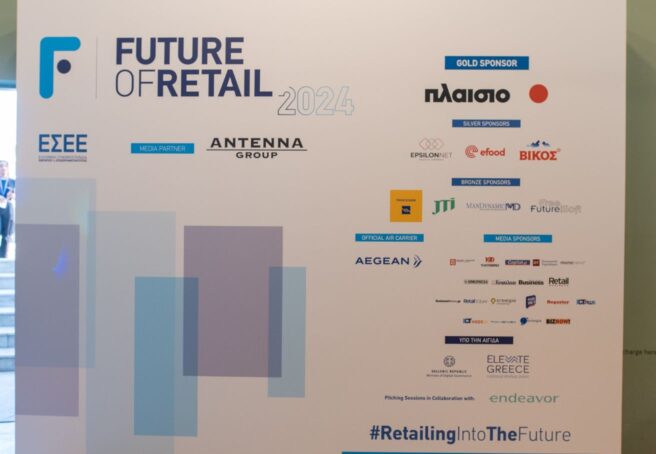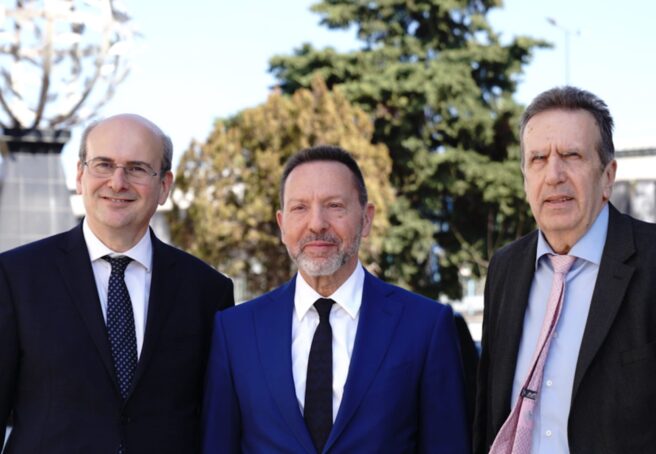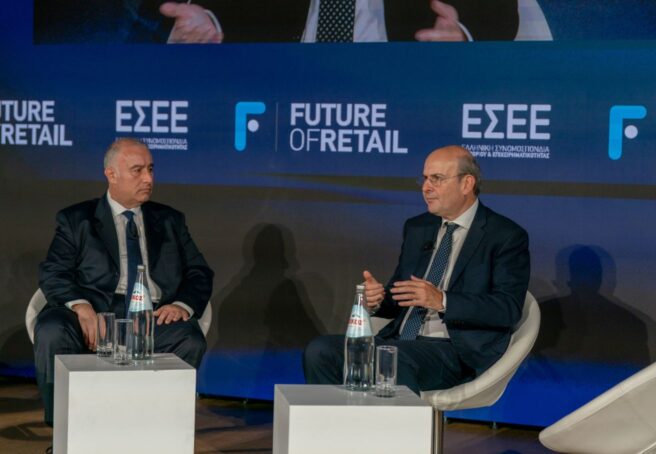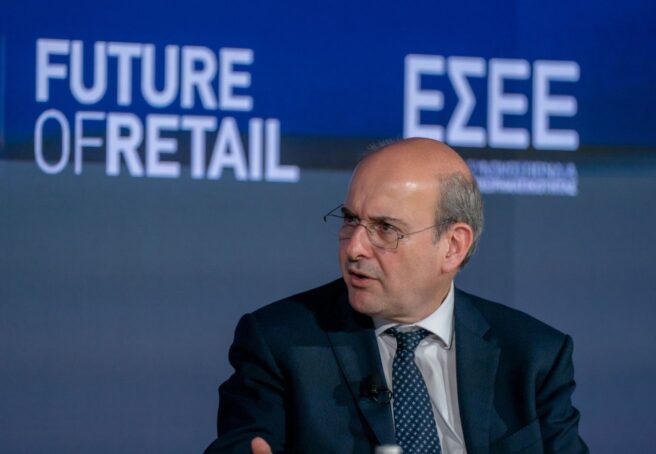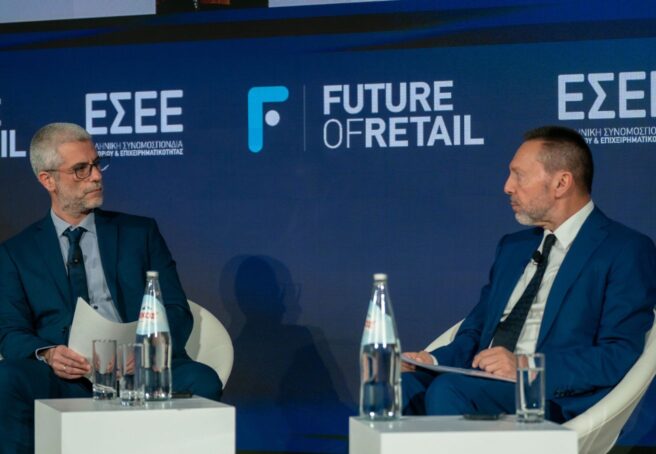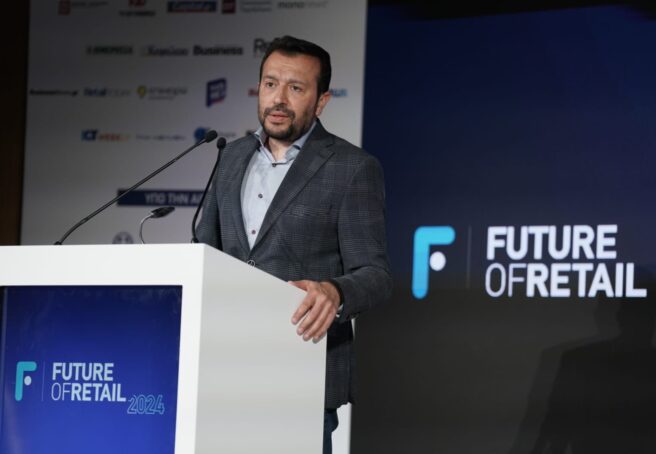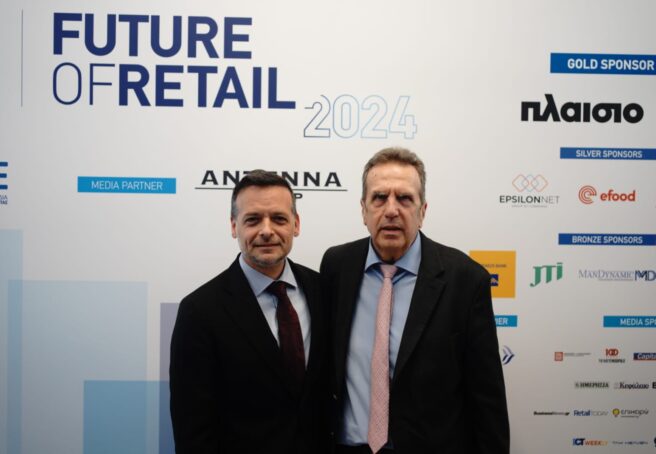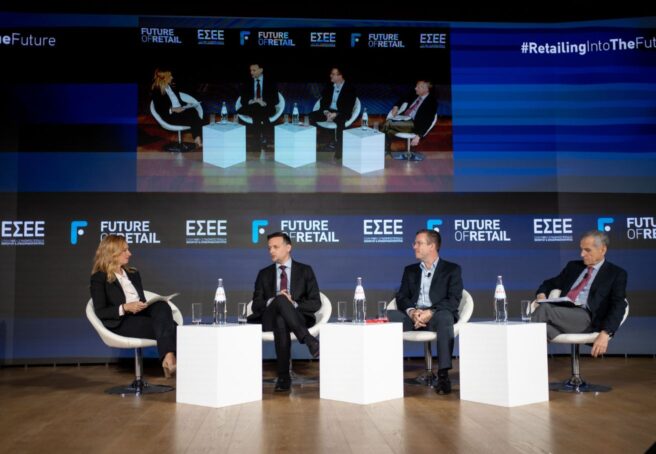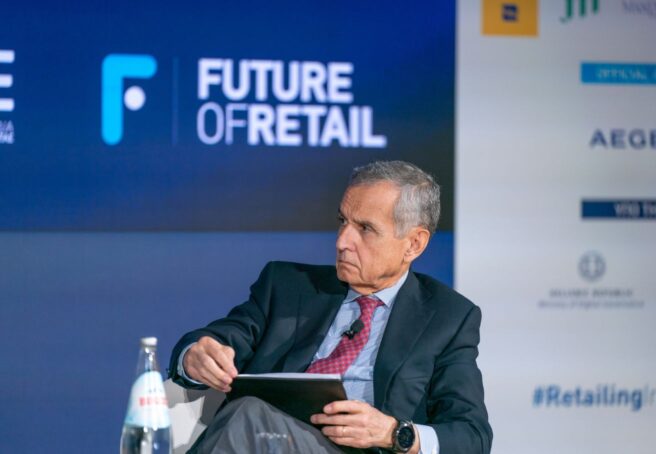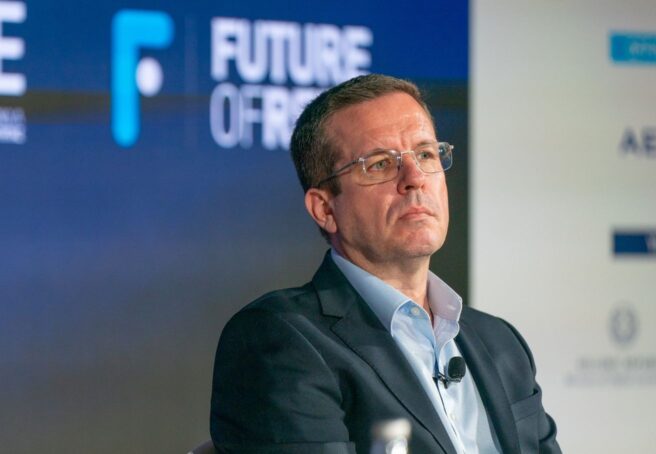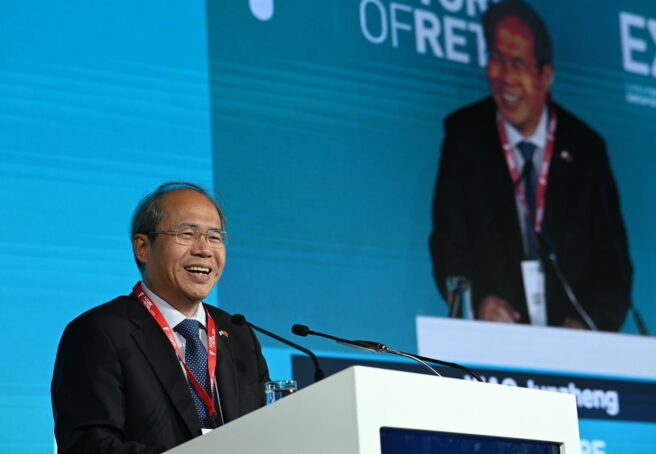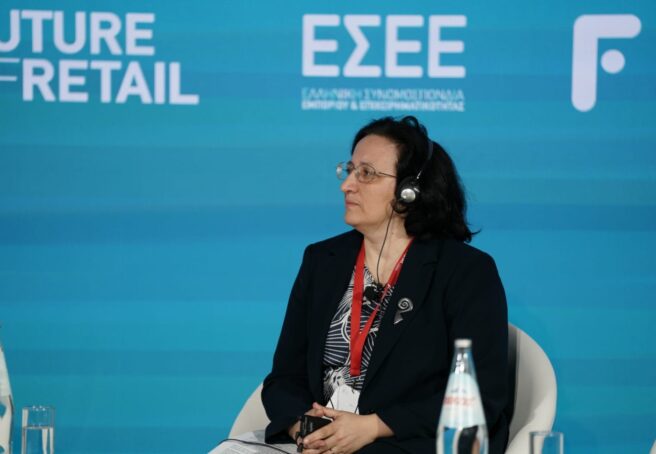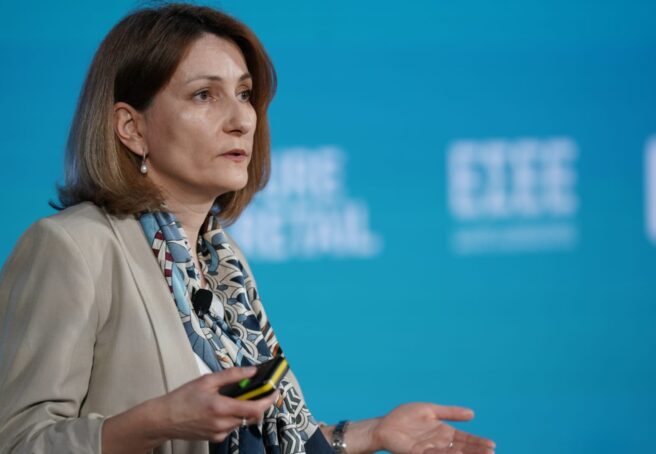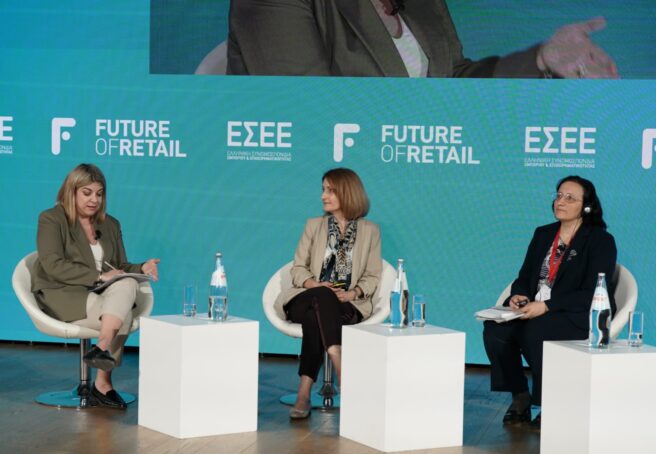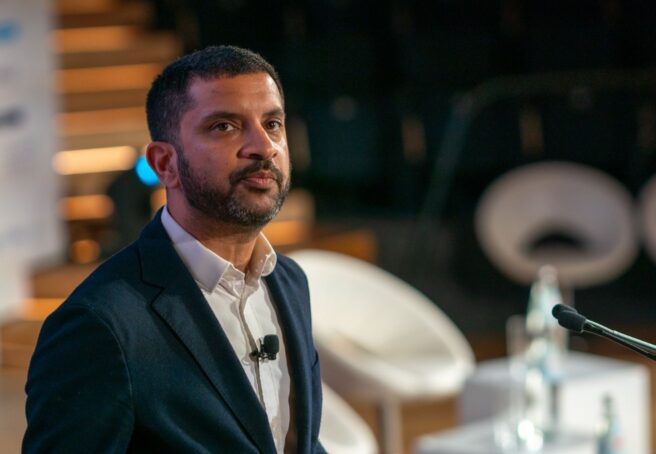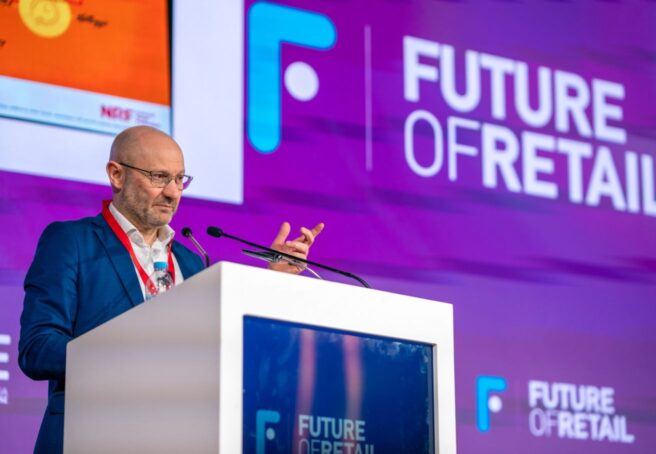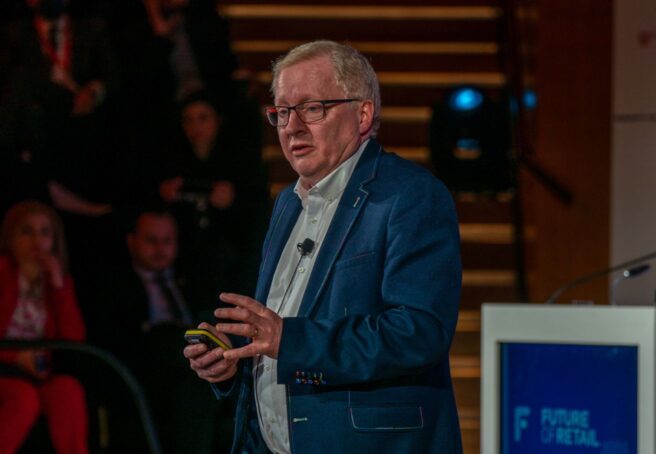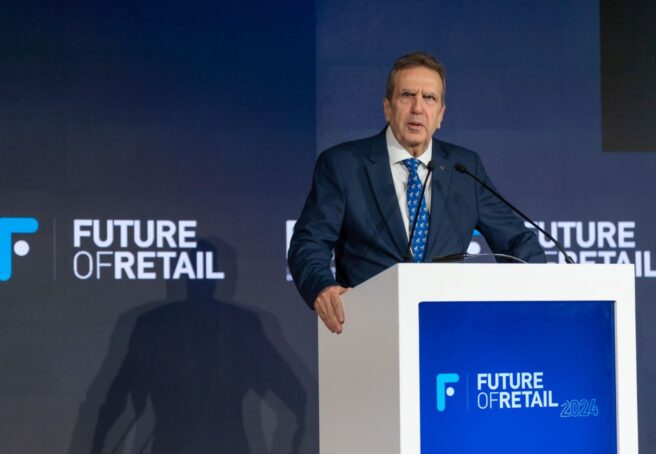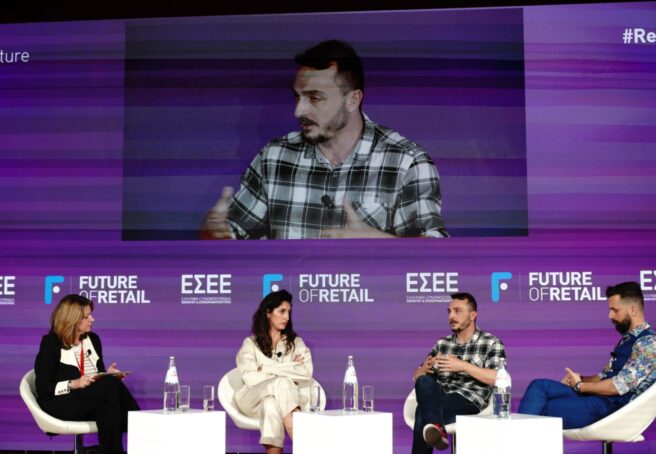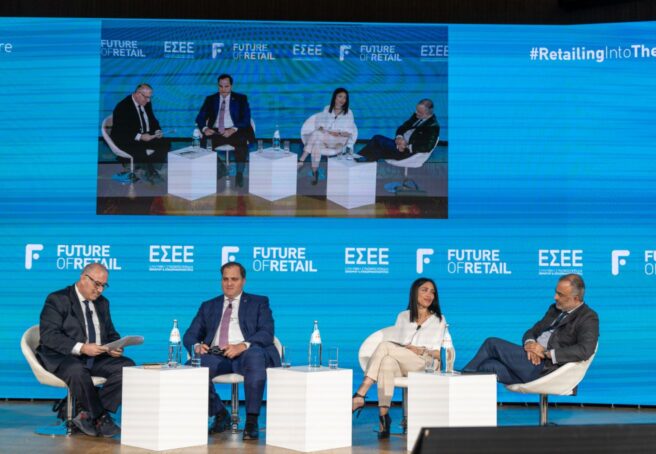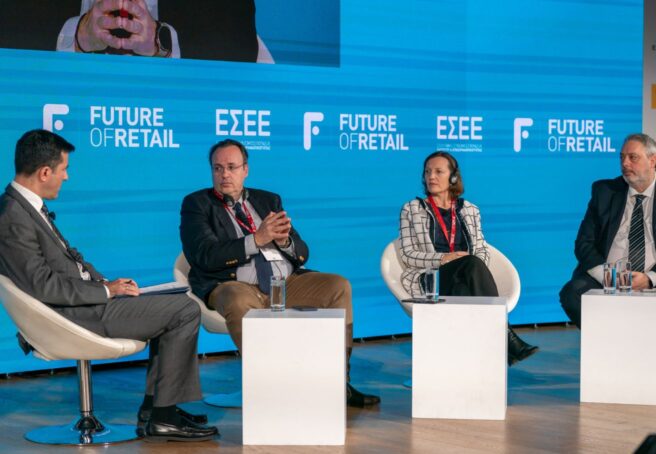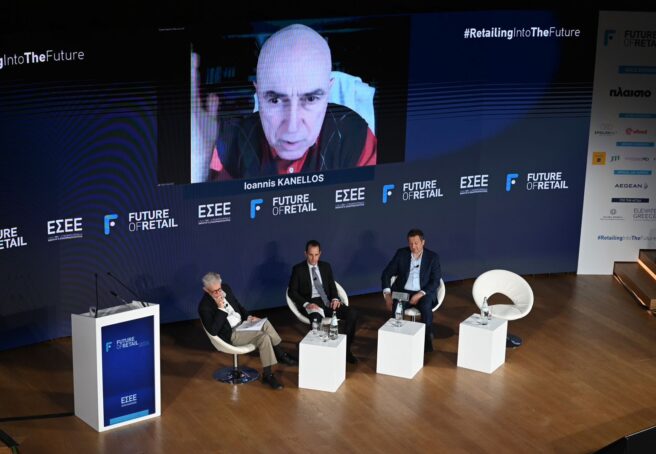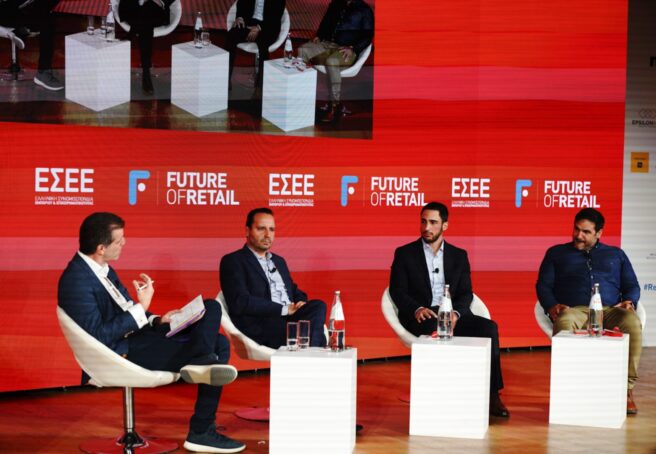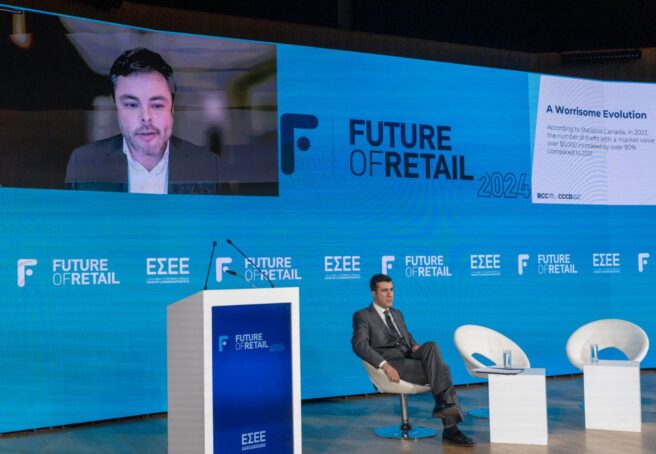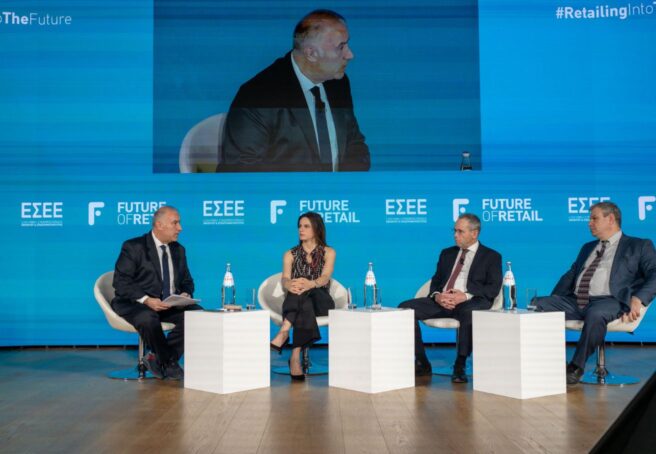ESEE successfully completed the Conference – a bridge to the future of Retail Commerce

The leading speakers on the second day of the proceedings focused on extroversion, Funding, Artificial Intelligence, Retail Analytics, and shopping in City Centers.
G. Karanikas: “This year, the Future of Retail perfectly served ESEE’s vision for a competitive and resilient Greek Commerce that embraces change with prudence, knowledge, and dynamism.”
The profile of the modern Greek retail business, which recognizes the opportunities and “smartly” faces the challenges of its digital and green transformation, was “crafted” over two days at the Future of Retail 2024 of ESEE by the leading entrepreneurs and the most influential worldwide in the field of Retail technocrats, academics and institutional representatives of the Retail Commerce, who gave a “rendezvous” on April 5 and 6 in the Technopolis of Athens with Greek traders and entrepreneurs from all over the country.
The “marathon” of speeches, presentations, seminars, start-up business pitches, and interventions by representatives of the Greek government and political parties, unprecedented in terms of Greek Commerce, quickly developed into a grand celebration of Retail.
Summarizing the main conclusions of the Conference, the President of ESEE, Mr. Giorgos Karanikas, stated: «The 3rd Future of Retail in a row served with absolute success the vision of the Hellenic Confederation of Commerce and Entrepreneurship, for a Greek Retail Commerce, competitive and durable, which ” embraces’ change, with prudence, knowledge and dynamism. The excellent thematic sections and speeches clearly showed that the concept of Interconnection is the “key” to success in the era of rapid changes experienced worldwide by all “ecosystems” of the economy. Interconnection between the productive and development sectors with innovative synergies, businesses with research and technology, sales interactions with e-commerce, and, of course, interconnection of all kinds of business activity with the green economy. In addition, according to research from around the world, the dynamics and value of the physical store and the digital age become clear if we want sustainable cities. The commercial store that integrates digital solutions upgrades the shopping experience of consumers and the lives of residents in general. I warmly thank the leading speakers from Greece and all over the world, the companies that participated in the Innovation Lab and the Seminars, as well as the representatives of the government and the parties that honored the commercial world and ESEE with their presence at the Future of Retail 2024».
With a constant motto of “Retailing into the Future,” but without at any moment losing its “grounding” with the present, the Conference turned on the second day of work into a field of a fruitful dialogue in which fundamental questions were raised and answered are of concern to the global Retail community, such as, among others, the strengthening of extroversion and financing needs of businesses, the “invasion” of artificial intelligence in retail and the value of Retail Analytics. The importance of commercial shops for the revitalization of cities was also analyzed.
Among the sections with European solid and Greek interest in the “twin transition” of Retail were between Ms. Lucia Cusmano, Chief Economist and Deputy Director of the OECD’s Entrepreneurship, Small and Medium Enterprises and Tourism Department, and Ms. Joanna Zawistowska, Head of Retail Policy at the European Commission’s DG Internal Market, Industry, Entrepreneurship and Media, with the coordinator Mrs. Milena Panagiotopoulou, Head of European and International Relations of INEMY-ESEE.
At the same time, the pitching sessions at the Innovation Lab were of particular interest, where start-ups and other companies had the opportunity to present the solutions they offer, with tools such as Business Intelligence, Data Analytics, artificial intelligence models, virtual reality technologies and geo-location technologies, which improve the services of businesses to their customers but also their internal operation itself.
Many thanks to the Future of Retail 2024 Conference Sponsors:
Gold Sponsor: CONTEXT
Silver Sponsors: EFOOD – EPSILON NET GROUP OF COMPANIES – VIKOS
Bronze Sponsors: PIRAEUS BANK – JTI – MAN DYNAMIC – FREE FUTURE SOFT
Future Air Carrier: AEGEAN
THEMATIC SECTIONS – SPEECHES – FIRESIDE CHATS
Saturday, April 6, 2024
-
Keynote Speech: Selvane Mohandas du Ménil, Managing Director, International Association of Department Stores
In the first Keynote Speech of the day, Mr. Salvane Mohandas du Ménil, Managing Director of the International Association of Department Stores, spoke about the historical relationship between advertising and retailing. This relationship can already be seen in the writings of the well-known 19th-century French writer Émile Zola.
Today, however, as the speaker pointed out, we are experiencing a transition from “commerce marketing,” i.e., advertising in the physical space, to “retail media,” i.e., advertising on the internet, e-shops, and social media. Of course, the more traditional “commerce marketing” is not going to disappear; it coexists with other more modern forms of advertising.
“This transition,” insisted Mr. Salvane Mohandas du Ménil, “is essential for retail. Modern developments in the global market and the density of competition make the survival of pure retail more and more difficult. Being active in advertising also allows it to serve even more customers in an increasingly digital age. And it’s relatively easy: department stores that belong to the organization the speaker represents already offer advertising tools that allow retailers to buy advertising space and promote their product to targeted consumers.”
The speaker explained that progress in the retail media space is not uniform. “This is a new strategy without a single vision and with a number of conflicting interests. But the benefits of innovative companies like Amazon, and in general the significant retailers’ revenues from retail media, are accelerating the transition.”
-
Keynote Speech: Paul Greenberg, President, NORA- National Online Retailers Association, FIRA Vice-President
In the second Keynote Speech of the day, Mr. Paul Greenberg, President of the National Online Retailers Association (NORA) and Vice President of the Federation of International Retail Associations (FIRA), emphasized that the Conference takes place “at the center of Western civilization,” Greece. This allows us to “turn to the past to draw some conclusions about the future,” about the “future of Retail.”
He pointed out that significant transformations are nothing new in the retail world. What’s different today is that, despite the “roadmap changes” such as Artificial Intelligence, we are building a Community that allows us to communicate continuously and constructively. “So we can intensify interaction with customers, adopt new technologies, not focus too much on methods and tools, and not lose creativity in retail.” Referring to Archimedes and Socrates, Mr. Greenberg expressed his desire for a “marriage” between science and philosophy.
More practically, he has turned his attention to the future of retail. It could, perhaps, do exactly what Amazon does. Perhaps more usefully, though, SMBs could “do what Amazon doesn’t.” The same, more or less, applies to entire markets. Greece (and to a certain extent Australia), unlike the multinational Amazon, is a small market, a “niche market” – it must take advantage and act based on the slogan “Get Big Get Niche.” In this regard, more importance should be given to the product’s origin, the connection between the product, the place, and the consumer, and the prevention of the new interests and practices of the next generation of consumers. The intermediaries between the public and the brand will play a decisive role here.
In closing, he referred to climate change and the stake of sustainability. “Who will pay the price?” he asked. “Do we have the possibility and the “luxury” not to face the Crisis, to continue clinging to the old methods and, for example, fast fashion? Perhaps a solution”, he concluded, “would be to turn to the local, the quality and the sustainable.”
-
Empowering the future of business leadership: focusing on skills
In the day’s first panel, Ms. Teta Karabini, Program Manager of Junior Achievement Europe, presented Skills4Retail, a program funded by the EU to develop skills and training in retail and wholesale commerce. With a focus on market and industry needs, this project offers solutions to bridge the growing digital skills gap. The four-year program will be implemented in Europe in 8 countries (Ireland, Austria, Romania, Hungary, Portugal, Latvia, Czech Republic, and Malta) with the support of local JA network offices, educational institutions, and the market. She also mentioned the importance of the entrepreneurship programs available for students of all levels in Europe through her Agency, which directly contributes to the development of entrepreneurship and other soft skills that will be able to be used not only by young people who decide to engage in business but in all professions. He focused on the institution of the Company Programme, which, for 100 years, has supported young students (15-18 years old) who want to engage in entrepreneurship. Thirty-six thousand students are enrolled in the program annually, creating more than 30,000 businesses, with Greek students standing out in European competitions.
Mr. Argyris Tzikopoulos, CEO of Junior Achievement Greece, commented on the “reality we have been facing in recent years” as “a void – a lack of professional orientation.” There is no strategy that, already at school, “helps guide children in choosing a profession based on skills, inclinations, etc. On the contrary, concludes Mr. Tzikopoulos, “the phenomenon of choosing a profession based on the family environment or the prospects of financial security is still observed. Vocational guidance will help the next generation make more realistic choices and head towards more “unconventional” professions that are not currently popular.”
Ms. Alexia Vassilaki, Project Manager of Existanze #connectingdots & JA Graduate, first mentioned the excellent performance (3rd place) she received as a university student, representing Greece in the pan-European JA Greece competition in Estonia. After the competition, she and her team participated in several others and was featured in Forbes’ 30 under 30 list. It has since encouraged young students to participate in entrepreneurship and innovation competitions and programs. Finally, Ms. Vasilaki lists some of the indicative gains that such competitions provide: networking skills, public speaking, so-called soft skills, critical thinking, and, perhaps the most important of them, adaptability to feedback.
-
Keynote Speech: Marco Zanardi, President, Retail Institute Italy
In another Keynote Speech, Mr. Marco Zanardi, President of the Retail Institute Italy, cited some important global economic figures, particularly emphasizing the gigantic debt far exceeding the total global turnover. Our economy, therefore, is a “debt economy”. “At the same time,” Mr. Zanardi further notes, “our society is increasingly digital, while wealth tends to be concentrated in a very wealthy and dynamic group of billionaires.”
The speaker even focused on another characteristic of the modern economy: innovation, the rapid pace of technological development, and the economic, social, and cultural changes they lead to. Among these changes, Mr. Zanardi noted the fragmentation of the value chain, as while research is still primarily done in the US, production is located elsewhere (in China, India, Mexico, and elsewhere).
Continuing, he commented on the “explosive growth of e-commerce” and, in that context, advertising, retail, various resulting services, and, of course, the influence of brands. The merchant’s operating environment, the speaker explained, is thus becoming increasingly complex as platforms grow and diversify, while the issue of sustainability is here to stay. But the marketer can be optimistic as long as he “remembers that he has to offer something specific and pay attention to trends,” develops “different approaches for each different culture, collaborates, and recognizes that he is part of an “ecosystem.” Finally, Mr. Zanardi insisted, the marketer must listen to the new generation, their preference for “yolo technology,” (You Only Look Once) their desire for modern leisure.
The speaker summarized by referring to the need to establish a “new business model” in which retail seeks digital solutions and adapts to the new digital world.
-
Single market successes and failures
In the eleventh panel of the Conference, Ms. Christel Delberghe, Director General of EuroCommerce, explained that the market is becoming increasingly unified, which impacts both Europe and the US, which are losing importance. Europe, the speaker claimed, must insist on integrating its market; it is “our most valuable asset,” an asset of competitiveness and resilience.
Mr. Thrasyvoulos Pagoulatos, General Director of Markets of the METRO SA Group, focused on the adverse effects of bureaucracy, complex administrative procedures, and the lack of (legislative) uniformity in applying regulations between EU member states. Nevertheless, the EU continues to produce legislation and regulations “in the logic of one size fits all” instead of “seeing things more flexibly.” In Greece, for example, it is evident that “the architecture of our economy is small and medium enterprises.”
In turn, Mr. Platonas Marlafekas, Vice President of the Board of Directors of HELLA-DIKA MAS, Vice President and Director of Marketing and Exports of LUX MARLAFEKAS ABEE, President of the Chamber of Achaia and President of EFEPAE, also commented on the differences that exist between the European member states, as well as inequality between countries. After emphasizing his commitment to the Greek market, Mr. Marlafekas stated, “If his business were in another EU country of a similar size to Greece (Belgium, for example), it would be ten times bigger.” “Greece,” he concludes, “must turn to increase production and exports and stop insisting on competition through price suppression. Equally important are the upcoming European elections, in which it is necessary for “reason to prevail.”
Closing the debate, Ms Delberghe commented on a European draft law leaked via Twitter in September on social media. This package will finalize the business-to-business payment within 30 days. “This,” claims the speaker, “would have devastating consequences on retail and small and medium-sized businesses by “drying up their liquidity.”
-
Keynote Speech: Michel Rochette (online), Président, CCCD – Québec, Retail Council of Canada
The following Keynote Speaker, Mr. Michel Rochette, President of the Retail Council of Canada and CCCD-Québec, participated in the Conference via online connection.
Its main subject was petty delinquency in retail, i.e., everyday petty thefts in stores, which actually increased in the aftermath of the Pandemic. Retailers, in turn, have begun to express concern about the phenomenon’s effects.
Mr. Rochette commented that the retailers “feel like they’re on their own.” For this reason, he proposed several measures that could increase the safety of stores and customers: facial recognition cameras, staff training regarding such incidents, and closer cooperation between Retailers, the Government, and the Police. At the same time, public opinion awareness must be achieved to consolidate a coalition between Citizens and Authorities.
-
Fireside Chat: Town Centers, Commerce and Last-Mile
Starting the discussion, Mr. Haris Doukas, Mayor of Athens and Professor at the School of Electrical and Computer Engineering of the National Technical University of Athens (NTUA), characteristically noted that “we are in times of great change, in the era of digital transformation and the green transition.” developments that inevitably affect the retail industry as well.
The first problem that arises – despite the efforts of the green revitalization of Athens – is the traffic congestion of the Center, which is to a certain extent due to the transportation and loading and unloading of retail businesses in the city’s narrow streets even during peak hours. A solution to this problem, which is on the discussion table not only in Athens but also in other big cities, is the creation of Urban Merchandise Consolidation Centers for mass transport products and the establishment of loading and unloading lanes. These measures are already being implemented in European cities. However, for this to happen (like many other similar initiatives), all involved will need consensus. We intend “by the summer to have created a group with all the competent bodies and in cooperation with the State, so that with the new year a new framework for freight transport can be established,” stressed Mr. Doukas.
Mr. Yiannis Vasilakos, Vice President and CEO of “Kotsovolos,” explained that “when you have to solve a problem, not everyone will be happy. There must be mutual compromises.” He specifically mentioned the prospect of limiting the power supply at night (so that the roads are open in the morning), creating protected positions for couriers and distributors in which fast charging will be possible, and making the conditions even for conventional feeder cars prohibited within the city. “For the city’s sustainability,” he concluded, “it is essential to make solutions that may not benefit our businesses in the short term. They will, however, ensure their sustainability in the future.”
The third interlocutor, Mr. Daniel Benardout, Chairman of the Board of Directors of ELTA, focused mainly on the rise of e-commerce and how it demands an immediate improvement in transport. At the same time, he notes that digitizing services such as those of ELTA carries the risk of losing the “emotional connection” between sender and recipient. He agrees with the speakers that the reduction of pollutants, the use of electric cars, and, in general, the city’s sustainability are primary goals to which traders must also contribute.
In the open discussion that followed, the three speakers dealt with tourism. First, Mr. Vasilakos emphasized the need to crack down on petty crime on the streets, which hurts tourism and Commerce. At this point, Mr. Mayor pointed out that “Athens must be a friendly city for its tourists and visitors, but it must also be friendly and functional for its residents. Investments are necessary to keep the tourism product attractive. At the same time, we must also move forward with measures for the city, which will address problems arising from hyper-tourism and promote a tourism model that will embrace the whole city. If Athens becomes impersonal and is not preserved authentic, it will also undermine the tourist product”.
-
Fireside Chat: Opportunities and challenges in retail
Ms. Stavroula Kambouridou, CEO of DIAS S.A., opened the discussion of this Fireside Chat by referring to IRIS, the interbank direct payment service developed and available by the company. He then commented on the tremendous success of IRIS for peer-to-peer money transfers, which has over 2.5m users and is doing 30x more transactions per month than three years ago, noting that similar payment products exist for freelancers and e-commerce commerce. “Compared to the rest of Europe,” emphasizes Ms. Kambouridou, “Greece is moving towards the new IRIS-type payment technologies more slowly, even though they are distinguished by high security, speed, ease of use, ensuring a distinct customer-centric experience.”
Mr. Vassilis Koutentakis, Senior General Manager and executive member of the Board of Directors. of Piraeus Bank commented positively on Greek banks: “Today they have a lot of liquidity and a lot of capital for financing. This represents a great opportunity for Retail, as Banks do not want their capital to remain idle and untapped.” “The condition,” explained Mr. Koutentakis, “is for small and medium-sized enterprises to cope with the challenges of digitization and, often, to realize that behind them, there are significant opportunities” (he characteristically mentioned the example of POS). “They must also have a clear business plan; the business must be healthy, and piles of bad loans must not be created again.” He said that if the above is achieved, “there are tools in Greece for financing tiny businesses (co-financing, guarantees, etc.).”
Mr. Nikos Vettas, Director General of the Foundation for Economic and Industrial Research (IOBE) and Professor at the Athens University of Economics and Business emphasized that today “the image of Retail in Greece is much more positive than in the rest of Europe. However, consumer confidence is lower in our country.” Then, referring to the future, he notes that ongoing technological advances in energy, artificial intelligence, and biotechnology “in the next twenty-five years will have made us so productive that we will have free time to travel and shop.”
The moderator was journalist Nikos Rogakos.
-
Fireside Chat: Kostis Hatzidakis, Minister of National Economy and Finance
This was followed by the discussion between Mr. Kostis Hatzidakis, Minister of National Economy and Finance, and the journalist Mr. Nikos Rogakos.
Mr. Rogakos started the discussion by referring to the many vital problems of small and medium-sized enterprises, mainly the lack of “funding taps.” The Minister replied, “All the moves made in the banking system are aimed at improving and increasing their financing. Some steps that have already been taken are improving competition between profitable banks and legislating the possibility for non-bank institutions to provide housing and other business loans. He then argued that it was a “myth” that the Recovery Fund “only exists for big business.” Instead, he noted that much of the funding is directed towards small and medium-sized enterprises for the digital and green transition. While regarding the market’s request for greater access of small and medium enterprises to bank loans, Mr. Minister argued that “steps have been taken,” noting, however, that there are limits set by the European Bank and the Greek banks that “want the enterprises to show profitability and have prospects.”
At this point, Mr. Rogakos turned the discussion to the debts of small and medium-sized enterprises. The Minister noted that the bad loans accumulated during the “great crisis” fell from 95 billion euros to 75 billion euros from 2019 to date. At the same time, the government’s priority, he said, is to avoid new exorbitant debts through more favorable regulations, low-interest rates, etc.
Continuing the discussion, the Minister explained that the abolition or not of advance tax does not “mean I pay more or less tax,” as “the sum remains the same.” More importantly, the government has made it easier for small and medium-sized businesses by reducing corporate tax and social security contributions. In addition, the Minister announced that there will be no extension to the connection between POS and the cash register. As he explained, in addition to avoiding tax evasion, speeding up the process is necessary because it has “entered the Recovery Fund as a milestone” with the risk of partially cutting off funding (as happened in Portugal). It would also be unfair to most merchants if their cash registers were connected to the POS.
Then, Mr. Rogakos referred to the general situation of society and the Greeks. The minister said, “The government and unemployment rates have already provided social benefits and decreased.” However, as the EU mandates, “If you have a surplus one year, you don’t give it away; instead, you keep it for the difficult years.” Mr. Hatzidakis expressed a profound optimism for the country’s economic future: “The situation is difficult, but the country has endured because there is a policy of fiscal stability and seriousness. If this continues, Greece will be able to achieve its goals.”
Ending with a short political comment, the Minister emphasized the need for the country to have “decent representation in Brussels, to be careful not to send the wrong message.” Any destabilization of Greece ” will have an overall impact on the economy.”
-
Fireside Chat: Giannis Stournaras, Governor of the Bank of Greece
The next Fireside Chat was between Mr. Yiannis Stournaras, Governor of the Bank of Greece, and Mr. Sotiris Nikas, Head of the Bloomberg Office in Athens.
As an opening question, Mr. Nikas asked, “Is it a fact that the economy is in a better state than in the last decade, and if so, what can be done to continue like this?”. Mr. Governor responded positively and emphasized the recovery of Tourism in the post-pandemic era. He also noted the modest performance of the German economy, whose model “consists of pieces that have ceased to exist today.” The goal set by Mr. Governor is to reduce the Greek debt through successive primary surpluses and to benefit from an “avalanche effect favorable to Greece.” Be that as it may, Greece is already considered a “success story,” provided that “the political stability that prevails in Greece continues.” “We can be sure that as long as the stability in our country continues, then we will grow in the coming years at a faster pace than our partners.”
Referring more specifically to the banking sector and its function with Retail Commerce, Mr. Governor pointed out that the money lent to small and medium enterprises constitutes 28% of the total in the last two years. At the same time, inflation is decreasing, while the rise in interest rates is lower for small and medium-sized enterprises than for large ones. The financial obstacles, therefore, in the way of Retailers are significantly smaller today. In the immediate future, Mr. Governor set as his primary goal the improvement of competition within the ecosystem of Greek banks and the establishment of “good and healthy cooperative banks.” As for the factors that may negatively affect Greece’s banking sector, Mr. Governor highlighted both geopolitical developments and climate change, especially major natural disasters. Problems: “We need cushions to deal with them in time.”
When asked by Mr. Nikas about the Recovery Fund, Mr. Stournaras pointed out with optimism that “Greece is among the countries with the greatest absorption.” If some bureaucratic obstacles are resolved, “disbursements to Greece can be converted into investments and businesses.” The 15 billion that Greece has received has not been fully disbursed, “but it seems that we are on the right track.”
-
Policies for a multi-layered approach to tackling the illicit tobacco commerce and maintaining market viability
Opening the discussion under the coordination of journalist Mr. Nikos Rogakus, Mr. Giorgos Pitsilis, Governor of the Independent Public Revenue Authority, emphasized the absolute importance of public revenues for planning the future of the Greek economy. In this sense, the limitation of tax evasion and smuggling emerges as pivotal, which is why, as Mr. Pitsilis noted, efforts to modernize mechanisms and tools to combat smuggling are ongoing. Some of the most modern means used by AADE are drones, specialized X-ray machines for checking luggage, specially trained dogs detecting substances and liquids, etc. However, especially in the case of tobacco, he explained that the situation is particularly complex due to the existence of “hard criminality networks” that “change practices depending on what the Administration does audits,” and it is even more burdened due to the geopolitical position of Greece as the “southeast gateway of Europe.” Finally, Mr. Pitsilis emphasized that the fight against tax evasion and smuggling has beneficial effects on the economy and society as a whole since it protects citizens from exposure to dangerous and harmful products.
Ms. Georgia Karuntzou, Director of Corporate Affairs and Communication – JTI, referred to the memorandum of cooperation signed by JTI with AADE and the company’s assistance in providing tools and training to the authorities to identify contraband tobacco products. “It is a matter of moral order and our obligation. At the same time, the main concern must be the change in the mentality of the citizens because if consumers do not buy illegal products, there will be a limitation of smuggling. Therefore, they must be informed about the negative effects of uncontrolled product use, which, although cheaper, are not the solution”.
Finally, Mr. Antonis Metaxas, Associate Professor of European Law at the National Kapodistrian University of Athens (EKPA), emphasized in his turn the enormous importance of ensuring healthy and legal competition in the country, which keeps prices stable and quality. The tobacco issue is even broader as it goes to the core of European law, raising questions about both advertising and the permissible limit of government intervention in price setting.
Regarding the use of POS, Mr. Pitsilis noted, referring specifically to the taxi industry, that “the lack of POS until recently exposed us as a country-tourist destination” and concluded by stating that “from the compliance checks of the professionals that have AADE has already started, the first picture shows that a relatively small percentage of delinquency is found.”
-
Greek brands as ambassadors
Mrs. Alexandra Stai, Founder of ATELIER BAOBAB, compared the entrepreneur’s experience in Greece and France, as she has worked in both countries. “In France,” he notes, “there is trust in professionals, while in Greece, this part must be freed,” with some bright exceptions in tourism, fashion, catering, and wines. Equally important work has to be done in the organized promotion of the image of Greek brands, in storytelling, and in positioning Greek brands abroad. Referring again to France, Ms. Stai explained that French businessmen are much more willing to “let a specialized agency work on their image.” Regarding digital branding, Mrs. Stai underlined the importance of technological tools such as social media and the newsletter, aiming for “coherence, consistency, and agreement between image and word.”
In his turn, Mr. Panagiotis Hatzilazaridis, CEO of ManaGi, agreed regarding the “difficulties and challenges in the battle for recognition in the international markets.” Greece has an academic background; “It brought technology in all sectors from abroad.” However, it still faces some critical obstacles, including more basic ones: the narrowness of liquidity (for addressing imaging professionals), the cultural heterogeneity of the foreign clientele, and the frequent lack of structured plans with depth of time and quality. If they are resolved, we can take advantage of the “bottomless depth of Greek history” and dare innovations, such as the gamification of mythology and Ancient Greece.
Finally, Mr. Christos Papachristou, co-creator of My Greek Games, stated that Greek entrepreneurship is still not sufficiently “recognizable” despite the progress made in this regard, which young people often lead. He also emphasized the importance of ancient Greek culture, although he warned that many entrepreneurs tend to rest on it. In closing, he noted that promoting a product in harmony with the country for which it is intended and displayed is essential.
The discussion was moderated by the journalist Ms. Letta Kalamaras.
-
Keynote Speech: Jonathan Reynolds, Associate Professor in Retail Marketing and Deputy Dean, Oxford University
Mr. Jonathan Reynolds, Associate Professor in Retail Marketing and Deputy Dean at the University of Oxford emphasized his keen interest in the future of retail. He then noted that sustainability, amidst this “tsunami of regulations,” is not only a challenge but also an opportunity for Retailers.
However, it is necessary to define sustainability first. Citing Chat GPT’s response, Mr Reynolds somewhat paradoxically defined sustainability as “a broad and complex concept that to find a meaningful solution we must first see what it is through the collaboration of many” stakeholders. He then highlighted the importance of the central role of Retailers as a “cross-section of the value chain” as they influence suppliers, producers, and the consumer public. He listed the benefits of sustainability innovation for Retailers as follows: brand differentiation and modernization and reaching the new generation; attracting investors who mostly care about sustainability and sustainability issues; increasing employee satisfaction, etc.
According to Mr Reynolds, inflation is the main obstacle to consuming sustainable products, which deters even sustainability-minded consumers. However, the fact remains that not all stakeholders are interested in ESG (Environmental, Social, and Governance) to the same extent and in the same way. Many claim it concerns large businesses, as it is an “expensive priority” that makes it difficult for SMEs to align. To overcome such difficulties and misconceptions, concludes Mr Reynolds, commerce associations must promote support for new and innovative members and their practices while fostering new collaboration patterns. Proximity to consumers and e-commerce are valuable tools to this end.
-
Fireside Chat: Speech by Mr. Nikos Pappa, Head of Finance & Development SYRIZA-PS
Mr. Nikos Pappas, Head of Finance and Development of SYRIZA – PS questioned the government’s management of both the housing loans granted by the banking system (which do not contribute to entrepreneurship) and the absorption of the Recovery Fund, which he described as “a mechanism for excluding smaller businesses from financing.” He emphasized that the tax policy must be fairer, commenting negatively on the high rates of indirect taxation. More specifically, the “surprise decision of the Government to tax small and medium-sized entrepreneurs and the self-employed with the so-called head tax” was for Mr. Pappas outside the programmatic commitments of the ruling Party. He noted that “the Greek economy is unfortunately meager in investments, and this is yet another proof of the concentration of capital in a few entrepreneurs.” Afterward, Mr. Pappas referred to Greece’s private debt, which he characterized as “the elephant in the room of the Greek economy.”
At the end of his speech, he proposed a series of measures such as boosting incomes • making use of surplus profits accumulated during the Climate Crisis to tackle precision •, reducing indirect taxes •, and reforming tax scales so that relief for natural persons with incomes of up to 100 thousand euros and for companies with profits of up to 220 thousand euros • the introduction of tax-free at 10 thousand euros for everyone • the complete abolition of advance tax, etc. “Greece,” he summarized, “has not yet entered the process of economic stability, although the foundations are there.” Such a development presupposes for Mr. Pappa “an immediate political change.”
-
The power of data in retail
The panel moderator was Mr. Giorgos Georgiopoulos, an Industry expert and advisor.
The panel’s first speaker, Mr. Thodoris Polykandriotis, VP of Greece & MENA, Ariadne Maps, presented the company Ariadne, a German start-up from 2019-2020 with Greek roots. The company’s objective is to focus on data related to retail commerce through mobile phone spotting. For the last two years, the company has also been active in Greece with a new service that includes communication with the customer through targeted and helpful messages when they are on the perimeter and inside the physical store. There is a strong demand from the market for raw data. They have created a separate data segment that can extract insights while highlighting loyalty, built through personalized advertising, as a critical issue. It was noted that a synthesis between business people learning technical skills and technicians developing business skills is vital. To the question, “How do small businesses benefit from data analytics or Ariadnis services?” Mr. Polykandriotis gave the example of smart cities and how they have been helped by data analysis. In particular, the commerce association of specific cities in Germany uses data to optimize services/advertising. In an additional question about the cost, it was stated that it is proportional to the level of service the entrepreneur wants and is adjusted according to his needs. In addition, he added that efforts have been made to communicate these innovative technologies to municipalities and regions within Greece.
Then Mr. Michalis Konstantoulakis, Director of BI & Insights, efood, who works at efood as the application’s data and insights manager, took the floor. He mentioned that in addition to the more widespread status of food as an ordering application, it is also a separate retailer with the efood market that recently acquired Kioksy’s. It was mentioned that although international trends say there is no loyalty, the application hosts a great wealth of data. It operates in hyper-competitive markets and invests in loyalty through excellent service, which treats the consumer as a customer, and through consistent coupons (personalized offers/ rubies). Meanwhile, specialized analysts observe the data both proactively and in real-time so that it is possible to inform commercial stakeholders, for example, that sales have decreased in specific areas so that the respective stakeholders can make decisions based on data. At the same time, he mentioned that nowadays, the application uses AI for customized orders (application suggestions).
The panel’s third speaker was Mr. Nikos Varvadoukas, VP of Brand, Customer & Omni channel Public Group. In his introduction, he mentioned that the Public also has a marketplace that has recently absorbed MediaMarkt. He emphasized that the Public has invested significantly in BOX NOW, highlighting the importance of the concept of time in today’s era. Finally, he presented another initiative, setting up a pilot through heat maps with the contribution of the “Ariadnis” company. He claims that supply chain management needs particular importance in the cost part, with data being a helper in Cost2serve. He added, “The specialized scientists employed in data-driven organizations usually see the tree and miss the forest, while these teams should have a mix of two categories to become a mix of multiple skills.” As Mr. Varvadoukas stated, “Personalization is a one-way street.” Afterward, he overemphasized that “challenging the digital channels through the store is the offline part.” Finally, he mentioned privacy as something sensitive. In this light, he drew the attention of businesses to branding/customer identification.
As raised, an indicative question for the future is how retail analytics can help businesses understand their customers’ behaviors.
-
Fireside Chat: Lucia Cusmano, Chief Economist & Deputy Director of the OECD’s Entrepreneurship, SMEs and Tourism Department & Joanna Zawistowska, Head of Retail Policy at the European Commission’s DG Internal Market, Industry, Entrepreneurship and Media
After the Conference, the last Fireside Chat was held with the interventions of Mrs. Lucia Cusmano, Chief Economist and Deputy Director of the Department of Entrepreneurship, Small and Medium Enterprises and Tourism of the OECD, and Joanna Zawistowska, Head of Retail Commerce Policy at DG Internal Market, Industry, Entrepreneurship and Media of the European Commission with the coordinator Mrs. Milena Panagiotopoulou, Head of EU Public Affairs & Advocacy, INEMY-ESEE. The coordinator prefaced the speakers by saying that the European Commission may not be a “fast ship,” but it sets goals and serves them steadily. This is why organizations like the European Commission should have a closer relationship/contact with it for policy formulation. “It is essential,” he said, “to work together, measure, share data, and communicate it to European partners to have more meaningful policies for the commerce sector, to make it even more inclusive and resilient.”
Ms. Joanna Zawistowska took the floor first and referred to the update of the EU’s industrial strategy, as after the pandemic, they were looking for ways and means to face the new challenges. As he pointed out, “the strategy of the E.U. placed among the 14 industrial ecosystems, retail commerce, which constitutes the largest ecosystem of the European economy, as it contributes 11.5% of the European added value – with 5.5 million businesses – 99% of which are small and medium enterprises – and 29 million employees ». To this end, the Commission in 2021 proposed working with relevant stakeholders to design and implement Transition Guides for each ecosystem. So, for the retail ecosystem, an open call was made in all European countries to businesses, public authorities, social partners, research organizations, academics, consumer associations, and other stakeholders to participate in the joint formulation of a Roadmap – the Transition Process, as they call it for a more resilient digital and green retail ecosystem. A co-formulation process was followed, and the six pillars of the action plan (resilience, digitalization, green transition, skills, finance and investment, just transition) were agreed with proposed actions for the European Union, Member States, and the private sector. Thus, on March 12, 2024, the Transition Pathway for Retail Commerce (Transition Pathway) and the platform that will act as a one-stop-shop for all relevant information regarding the retail ecosystem and related initiatives, such as the revitalizing city centers by boosting retail, the initiative to institutionalize the European capital for small commerce, the Retail Restrictiveness Indicator, which refers to the constraints of retail commerce and others. Ms. Zawistowska also referred to the project that the European Commission is starting in collaboration with the OECD for the twin transition of retail commerce in city centers in urban and rural areas; as she noted, “retail commerce is an important part of the social fabric in cities and the region so we will work with the OECD to support the twin transition through coordinated action to revitalize commerce in city centers.”
Then, Ms. Lucia Cusmano took the floor and referred to an important initiative of the OECD, which aims to be the framework for discussion to synthesize opinions and national experiences both from the OECD networks (D4SME, Local Development Forum, Champion Mayors ) and the European Commission (#Revitalise Retail) to develop some quantitative international indicators that will act as a basis for policy formulation in the context of the twin transitions for retail commerce in city centers in urban and rural areas. Emphasizing, thus, that “when you start with something ambitious, the first thing you have to do is listen and learn,” he said that changes are swift and retail has to adapt and changes are made in the business. Of course, this cannot be done without an organized system or tools that at least help organize it. We cannot measure with data from five years ago. Policy-making is equally essential; these are pillars of our actions. We are examining infrastructure building based on data and indicators to see the pace of adaptation. First, we should measure the people, their skills, what retail offers them, and the background of the entrepreneurs. Businesses are essential to urban and rural well-being because they contribute to domestic GDP. He expressed the desire and pursuit to flourish retail commerce and the areas that host it. This can be achieved by measuring the assessment of adaptation to new technologies for both entrepreneurs and consumers. He gave the example of the United Kingdom regarding the implementation of a Renewal Plan in which citizens participated in reforming the city center. The issue of sustainability is difficult to measure in small businesses. Companies in Europe are small, so it isn’t easy to collect data. They must be included in the measurement because they face different difficulties. When discussing successful policies, we must be clear about which businesses we refer to.
-
Keynote Speech: Xiao Junzheng, Ambassador of the People’s Republic of China to Greece
The Ambassador of China in Athens started his speech by stating that this is not his field of activity. However, he wished to show his honor to the president of ESEE for the invitation.
“It is a great honor for me to speak about the future of retail commerce,” he said characteristically, referring to the relations between the two countries that cooperate. “China has gained rich experience in e-commerce by being the world’s largest online retail market for 11 consecutive years. Annual online retail sales will reach around €2 trillion in 2023. Physical goods sold online accounted for 27.6% of total retail sales of consumer goods, a record high. The number of e-commerce workers increased to more than 70 million in 2023.”
The Ambassador concluded his speech by saying that China has signed an e-commerce agreement with 30 countries and hopes for our country’s inclusion in this agreement. He stressed that “We want more Greek businesses in China” and that “the Chinese embassy will support all companies wishing to cooperate with China.”
-
Artificial intelligence in retail commerce
The moderator of the panel, Mr. Aristos Doxiadis, Partner, Big Pi Ventures, introduced the audience to the topic, pointed out the incredible speed of changes in the field of artificial intelligence, and addressed the first question to Mr. Ioannis Kanellos, Professor at the Department of Informatics of IMT University Atlantique: “How much will artificial intelligence change the ways we work, produce and consume, and over what time horizon will these big changes happen?”
Mr. Kanellos, after proceeding to an interesting historical review of the relationship between modern culture and knowledge before and after the advent of computers in our lives, pointed out that today, “The idea that artificial intelligence is not only an interesting but also an inevitable factor for the development of society and the economy, seems to be entrenched in our consciousness. AI produces services of higher quality than humans could imagine, even new raw materials. For the first time, man competes with something non-human.”
Specifically for commerce, Mr. Kanellos listed several areas and spheres of business activity where he believes that artificial intelligence will have a substantial impact: “Obviously, in products and services in the marketing and promotion of those products and services, in accounting, management, be it stocks and their distribution, or space. I also manage risk and security, customer models, and profiles. Data analysis is done during collection, analysis, and decision-making. In terms of sustainability, the business plan also includes the recycling of products. Also, in the social responsibility of businesses and the ecological and social responsibility. In the competitions inside the Internet and outside it”.
The moderator immediately gave the floor to Mr. Haris Kampanis, Business Applications Leader, CEMA Microsoft, asking him to refer to what a marketer who has not yet tried its use can expect from artificial intelligence in 3-5 years, if and has “what it takes to digitize it so far.” Mr. Kampanis emphasized that the developments will be much shorter for each merchant.
Characteristically, he said, “Just as in the past we had the mouse that brought the first revolution in computing, now we have a way to explain to the computer what we want and have it offer us.” In particular, referring to the Internet of Things, he noted that “he will be able to have a site where he will investigate the customer’s needs, simply ask questions, and the customer will be able to describe what he is asking for or validate the order and that automatically convert it for execution, without directing him somewhere else.” He continued with another example, saying that on a website the marketer “will be able, depending on the customer’s profile, to automatically provide a personalized website with offers that will interest the customer. Also, he can start a conversation with the store through apps, follow up with a visit to the store, and send an email. All that will be connected, and he can do what he wants.”
Mr. Frangiskos Theophylaktos, CEO of Elevate Greece, took the floor immediately after and initially expressed his thanks to ESEE, the President, Mr. G. Karanikas, and his colleagues for the cooperation of Elevate Greece with the Confederation, through which the opportunity for 13 start-ups from Elevate’s register, to have the chance to demonstrate their solutions and products in the Innovation Lab, as part of the Future of Retail 2024. He then pointed out that “there is a good penetration of AI in companies, and it will continue to exist. AIs are being trained so that they can, for example, help customers buy clothes by showing the garment to the customer. This is how sales increase. It works like a personal stylist but cheaper and faster.” He added that according to measurements, the specific application has brought about a 130% increase in operations, i.e., the visitor who eventually becomes a buyer and a 40% increase in the value of the average shopping basket. Then, Mr. Theophylaktos referred to the two steps the marketer should follow at the beginning of the artificial intelligence road: Defining a specific goal and understanding his needs after finding the right expert to consult.
Of interest was Mr. Kampanis‘ additional reference to the use of artificial intelligence to enhance the shopping experience of tourists. “I believe that shops will be enriched with artificial intelligence, for example, by making purchases in multiple languages available in the physical store. It won’t hurt them, tiny and medium-sized businesses,” added: “This is a revolution for the good of both the country and our businesses that are now starting, which is democratizing markets. We must not lose her.”
For his part, Mr. Kanellos emphasized: “AI is now transforming our techniques and reality itself. We should understand that we are calling on AI to contribute to our lives and commerce positively and that it is a technological paradigm, not a revolution to be exploited.” In concluding the discussion, Mr. Theophylaktos said he was optimistic about commerce: “The way and the experience we will now have in shopping will change. Thus, we can also strengthen elements in which we have identified that we are weak (businesses), receiving information practically at any time from the best, which the traders themselves will choose”.
____________
The large international ESEE Conference drew the attention of the global retail ecosystem to Greece and attracted institutional representatives from all major international organizations on both days.
Special mention must go to Ms. Christel Delberghe, Director General of EuroCommerce, the European retail and wholesale commerce organization. He has established a solid friendship and cooperation bond with ESEE for several years. Its contribution is significant in that the European Commission has included Retail Commerce among the 14 industrial ecosystems of the European Union. With the systematic work he did with the various working groups of EuroCommerce, both at the level of producing documented positions and at the level of exerting pressure on the European Parliament and the European Commission, he contributed catalytically to highlighting the particular importance of the retail ecosystem for the development and social cohesion in the Union and its member states.
Also significant was the presence and exciting speech of Mr. Kevin Peng, President of the China Chain Store & Franchise Association (CCFA). He is President of the China Chain Store and Franchise Association (CCFA) and sits on the Board of Directors of the International Federation of Retail Associations (FIRA) as Finance Officer. During his presidency of the China Association of Chain Stores and Franchises, he established the China Retail Technology Innovation Center, the China Retail Innovation Center, to help China’s retail ecosystem better understand and implement new technologies to facilitate higher efficiency and improved services.
WORKSHOPS 2nd WORKING DAY
- 11:00-12:00
AI technologies (CoPilot) for collaboration and communication with stores
Joanna Vathis, Cloud Architect – Modern Workplace, Bewise - 12:30-13:30
Inspiring Trust Creating Impact – The mindset and skillset of innovation: Innovation belongs to everyone!
Stella Rapti Founder & CEO | Over & Above EU - 14:00-15:00
Lobbying Strategies: Insights from Greece and the EU
Kostas Eleftheriou, Assistant Professor of Political and Historical Sociology at the Department of Political Science of the Democritus University of Thrace
Milena Panagiotopoulou, Head of EU Public Affairs & Advocacy, ESEE - 15:30-16:30
Epsilon Smart Ergani is the Smart cloud solution for the Digital Job Card market, connecting Employees, Employers, and Accountants online!
Rania Apostolopoulou Customer, Success Manager HRM - 18:30-19:30
The future of commerce through Live shopping
George Floras, Business Consultant
-COMPLETION OF WORKS FUTURE OF RETAIL 2024-
Read here the conclusions of the 1st day of the ESEE FUTURE OF RETAIL 2024 Conference.
Gold Sponsors

Silver Sponsors

Bronze Sponsors

Future Air Carrier

Under the auspices

Media Partner

Media Sponsors

Pitching Sessions in Collaboration with:

